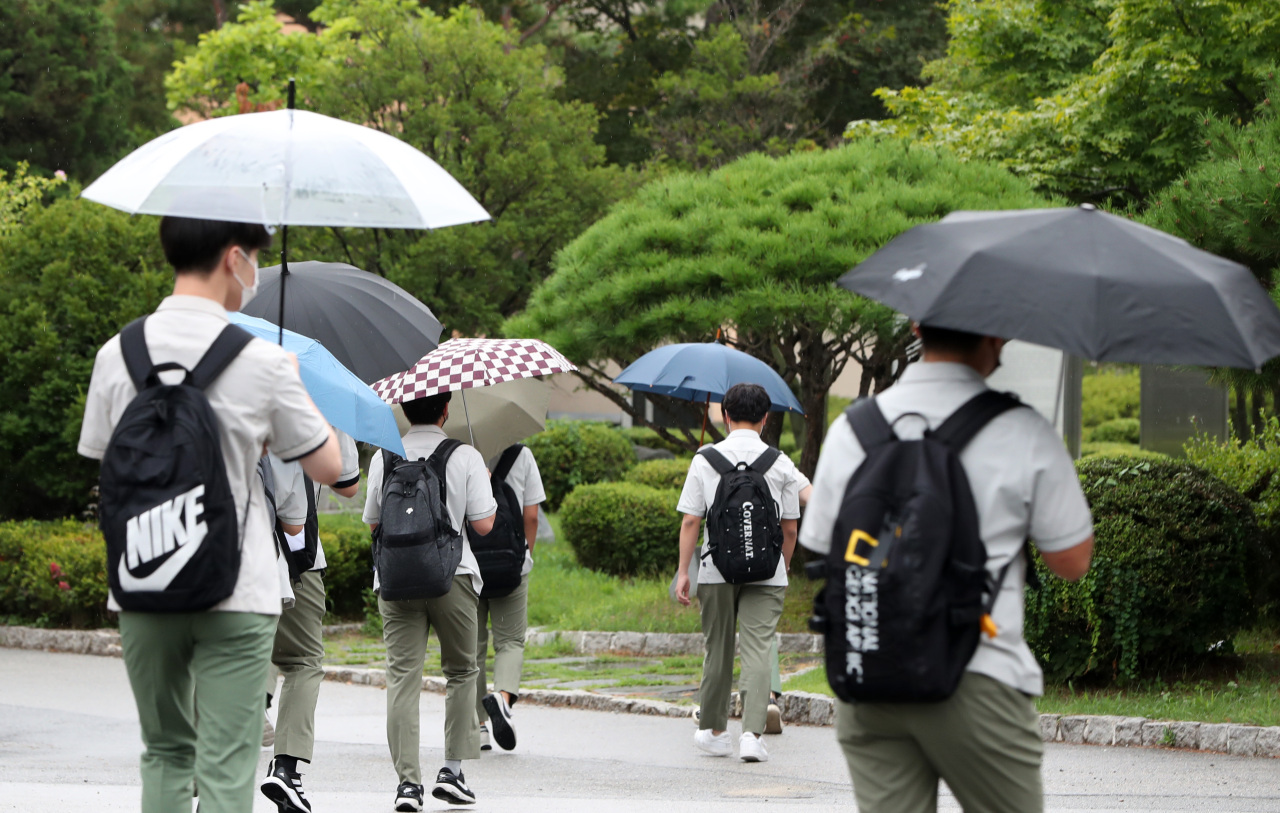
Private high schools in Korea face a phased abolition under Moon Jae-in administration’s policy aimed at widening equal opportunity in education. The education reform efforts will strip more than 70 private high schools of their status by 2025.
But the move to abolish private schools is met by strong protest, with some critics decrying it as “unconstitutional.”
“Abolishing private schools undermines the diversity and autonomy of education -- a fundamental right guaranteed by the Constitution -- and forces students into a uniform educational system without regard for individual academic needs,” read a statement issued by a union of private schools.
The drive to turn private schools into regular, mainstream schools is already compromising the quality of classes, according to an English teacher at a foreign-language high school just outside Seoul.
She said the elimination of her school’s admission screening process, one of the policy-driven changes to make the place more equitable, was “slowly eroding what was special about the school.” To a degree, she said, the administration’s clampdown on private schools was at fault.
“We used to offer classes like advanced English literature, which we had to get rid of, because students couldn’t keep up or weren’t interested,” she said. Instead, the English faculty now resorts to “the monotony of standard Korean education” and focuses on preparing students for the national university exam, the Suneung.
“Abolishing private high schools in Korea doesn’t hurt wealthy students -- they can go to prep schools elsewhere in the world. It screws over students from middle-class families with academic ambitions,” she said.
“(Educational equity policies) don’t make public schools better. They just make private schools, which have been doing well in their own right, worse.”
A public high school teacher of 10 years in Nowon, northern Seoul, said measures on how to improve public schools were lacking in the current conversations about making the education system more equitable.
“I agree with the overall goal of bridging the gap between public and private schools. But the approach being taken seems to ignore the reality of public education,” she said.
She said teaching in public school classrooms was forced to be more or less textbook-centered because of the wide gap in students’ performance.
In English class, where the achievement divide tends to be “starker,” for instance, “kids who excel are so well-read and even quite fluent, which is likely a result of years of investments. On the other hand, some kids struggle just getting through the class material,” she said. “So it doesn’t serve high-achieving students.”
Once private schools are gone, it will be hard for public schools to fill their shoes. “The kind of programs offered at private schools are almost impossible for public schools to even mimic,” she said.
“I don’t think closing down private schools -- without improving public schools -- is the solution.”
Park Joo-ho, an educational studies professor at Hanyang University, said abolishing private schools -- including the “independent” high schools and international schools -- was about “changing how these schools admit students.” “In other words, it’s about doing away with selectivity,” he said.
“And it’s also about whether we should let students choose which schools or educational services fit their needs.”
He said the downside of getting rid of private schools was “less diversity.” Doing so also risked going against the framework act on education, which stipulates that schools will have autonomy in their administrations, he said. Some private schools have taken the abolition orders to the court, and won.
“You could argue that universities should walk the same path of standardization in the long run.”
Sung Ki-sun, who headed the Korea Institute of Curriculum and Evaluation under the Prime Minister’s office for more than two years until February, said the problem with selective high schools was “the discrepancy in access.” “Their existence fuels inequity.”
He said public high schools will soon be offering a credit system permitting students to choose which subjects they take. “The credit system will have the best of both worlds -- the accessibility of public schools and the diverse curriculum of private schools,” he said.
Ultimately, he admitted the transformation would not be complete without a major reform of the Suneung itself, which was also being planned to be implemented six to seven school years down the road.
“Private schools exist for just about 10 percent of the school-age population. Education opportunities should be universal at least up to high school,” he said.
By Kim Arin (arin@heraldcorp.com)







![[KH Explains] How should Korea adjust its trade defenses against Chinese EVs?](http://res.heraldm.com/phpwas/restmb_idxmake.php?idx=644&simg=/content/image/2024/04/15/20240415050562_0.jpg&u=20240415144419)












![[Today’s K-pop] Stray Kids to return soon: report](http://res.heraldm.com/phpwas/restmb_idxmake.php?idx=642&simg=/content/image/2024/04/16/20240416050713_0.jpg&u=)